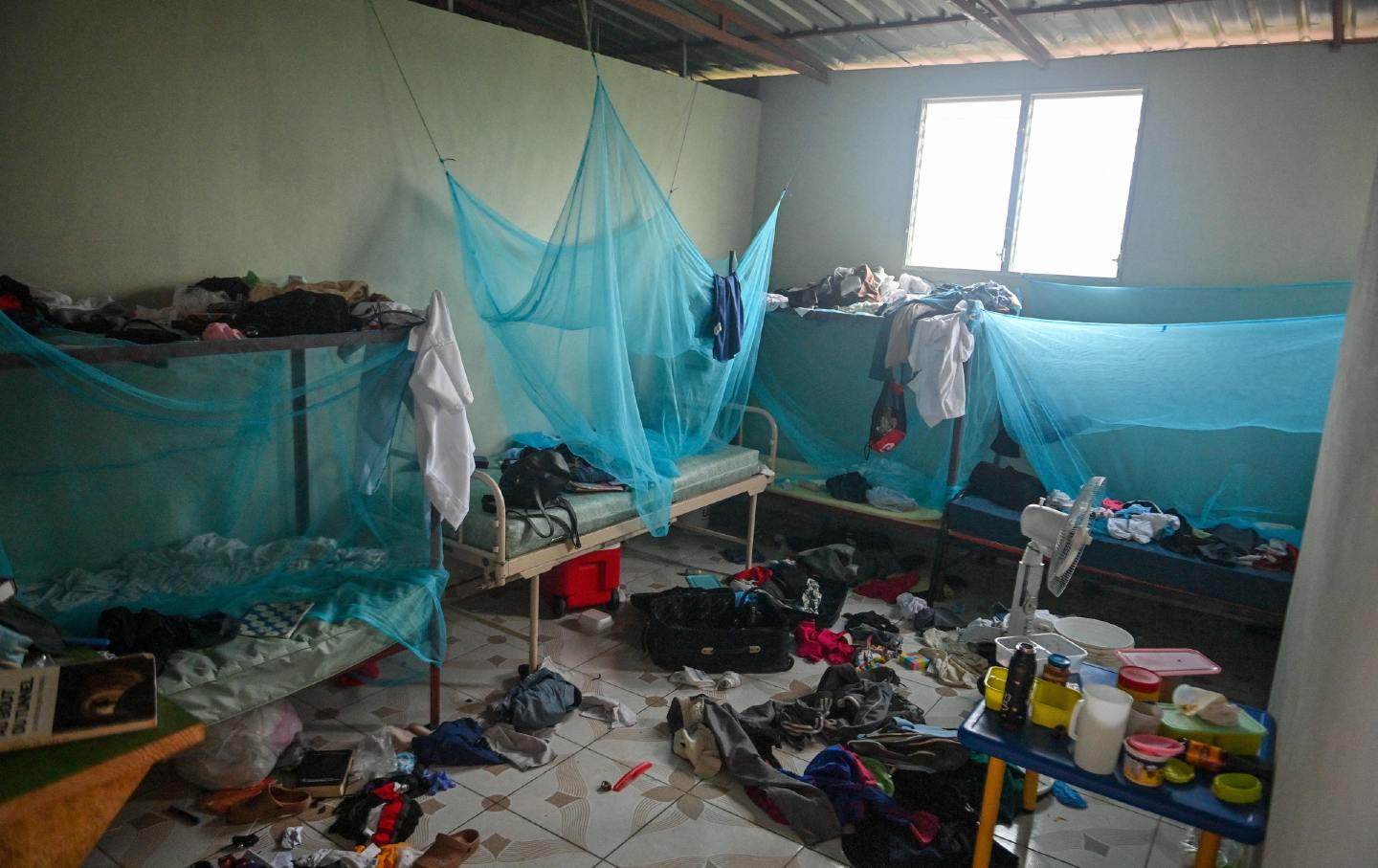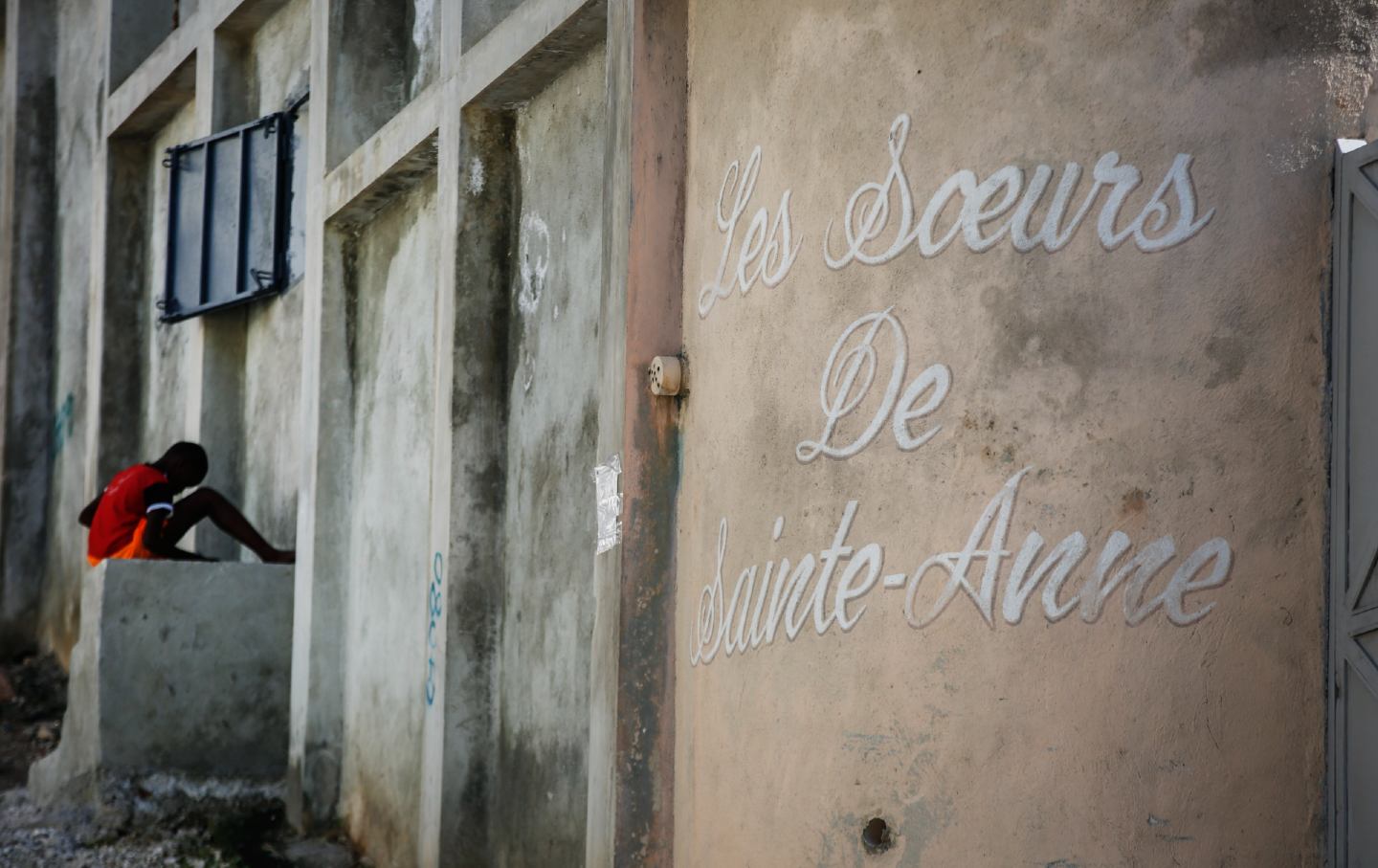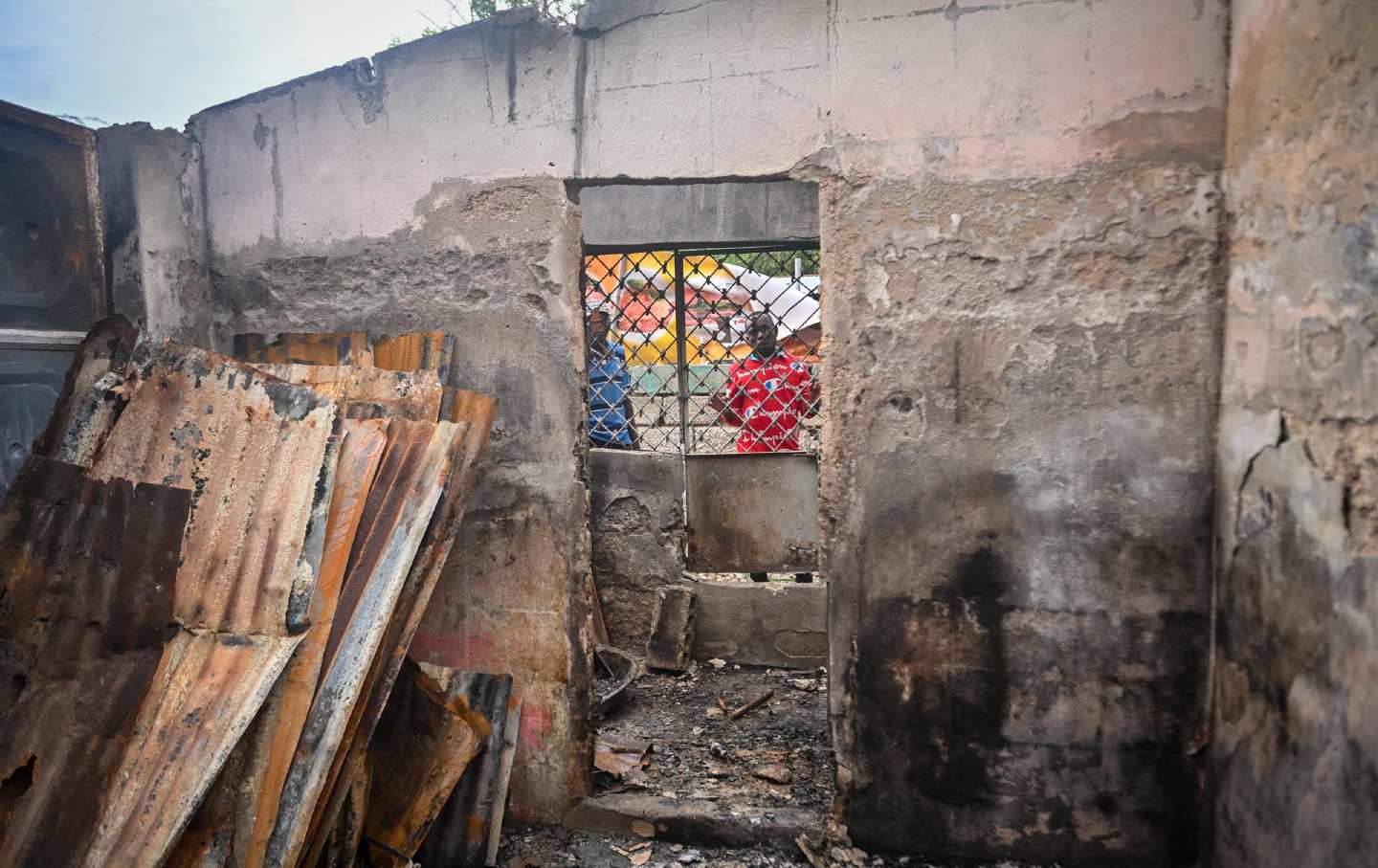Why Is the US Paying Kenya to Clean Up the Mess We Made in Haiti?
The Biden administration likes to talk about democracy, but when it comes to the disaster unfolding a few hundred miles from Miami, democracy is apparently far too dangerous.

Not long after midnight on February 7, 1986, a ragtag huddle of international reporters assembled on the tarmac at François Duvalier International Airport in Port-au-Prince, and we watched as Jean-Claude Duvalier, son of the dictator for whom the airport was named, fled Haiti on a US Air Force jet with his wife, BMW, mom, and kids, and trunks reportedly loaded with treasures and dollars. After years of popular protest against Duvalier, the United States had finally helped arrange his removal.
That morning, the ideal of democracy seemed to flower in the contrails of Duvalier’s plane, although in fact he was replaced by a general and a junta. Elections were planned. Even before sunrise, people took to the streets to celebrate their liberation, and by the dozens, all over the capital, future presidential candidates emerged. A new constitution was written, upholding electoral democracy.
I didn’t think back then that 38 years later I would be writing about a Haiti even more brutalized than in the Duvalier era, a Haiti being destroyed neighborhood by neighborhood by rival and conscienceless gangs armed to the teeth and operating with impunity, while an immoral and intransigent dictator supported by the United States looks the other way. The situation today for most Haitians (but not every Haitian) is so much worse and more dangerous now than it was under the Duvaliers.
I certainly did not imagine that it would be Kenya—a country whose name has never exactly been on the lips of all Haitians—that would be called on by the international community to save Haiti from its present imbroglio. “Called on,” is what I write, but what I really mean is “hired as mercenaries”—thus sparing the United States from spilling any of its own blood in whatever battles may be upcoming.
But indeed, at Haiti’s request and with the blessing of the US, Canada, and the UN Security Council, Kenya has been asked to send around 1,000 police officers into the country in the coming weeks. This force, along with a potential 2,000 further troops from several small Caribbean nations, is intended to tame the 200 gangs of Haiti, around 95 of which are based in the capital. So that makes 15 men, if all the countries sign up, to control each gang.
Not fucking likely, as a Haitian friend of mine said, discussing the Kenyan plan.
Mawozo 400, one of the largest of those 200 or so gangs, itself claims more than 1,000 members.
The Biden administration has pledged to provide $200 million for this pacification effort, half of it through the Defense Department and half to be appropriated (eventually, perhaps) by Congress. Though the top Kenyan court has twice ruled against the deployment of the national police on various procedural grounds, Kenyan President William Ruto said this week that he intends to send a contingent to Haiti within weeks, if not days.
Haiti desperately needs help. In the past two and a half years, since the assassination of Haitian president Jovenel Moise in his bedroom on July 7, 2021, an estimated 300,000 people have been displaced in gang warfare, among them 170,000 children, and around 5,000 were murdered in 2023 alone; gangs have brought the country to a halt repeatedly and for weeks at a time; they’ve burned down police stations and courthouses; they’ve taken over prisons and assassinated and brutalized police officers. Women and children have been raped, beaten, murdered. Schools have been shut, hospitals forced to close down, and sanitation services, never perfect, all but abandoned. Meanwhile, the cost of living keeps rising, fuel is sold at rapacious prices on the black market, and all norms of daily life have had to be cast aside. Poverty is ever more grueling, and famine is a distinct possibility.
Don’t just shrug because you have heard this tune before. This is happening day by day to real people just like you, to people like Ukrainians, like Gazans. And it’s playing out only 600 miles from the coast of Florida.
There is no functioning government for Haitians to turn to, only the lonely, unelected, de facto prime minister Ariel Henry, a neurosurgeon and longtime political hack. Because no elections have been held for seven years, there is literally no legislature, no court system, no elected provincial government. The police are often corrupt: You can’t necessarily tell the cops from the criminals. Though Henry pledged to leave office on February 7, which, by Haitian tradition since 1991, is Inauguration Day, there is not much sign from him that he is on his way out, and the international community is clearly reluctant to have him go before they’ve found someone to replace him.
And just in case for a moment you thought the United States was not involved, most of the ammunition and guns used by the Haitian gangs come through Miami, according to a 2023 report by the UN Office on Drugs and Crime.
All this horror and death are playing out in Haiti in spite of almost two decades of nearly continuous international military presence on the ground meant to stabilize the situation and promote democracy. (Often when you say “in spite of” in Haiti, you might equally say “because of…”) To say nothing of hundreds of millions of dollars in foreign aid and the presence of a whack-a-mole of an estimated 10,000 independent nongovernmental organizations. The military presence and the foreign aid packages, plus the ongoing work of the NGOs, have weakened the Haitian government over time, proving to everyone that the government itself was both useless and, it seemed, unnecessary. By the time Moise was assassinated and Henry replaced him, the government had become largely vestigial. It was easy for rising gangsterism to give it the coup de grâce.
So yes, Haiti needs help because it has gotten too much help and overall that help has been delivered for cynical aims.
In his magisterial new book, Aid State: Elite Panic, Disaster Capitalism, and the Battle to Control Haiti, Jake Johnston argues that these armed interventions and their companion aid infusions have been used primarily to control popular unrest and protect the property and business enterprises of the small but powerful Haitian elite and its foreign partners, while little or nothing has been done to safeguard the average citizen nor to benefit the Haitian people more generally, in terms of education, healthcare, sanitation, and infrastructure. Especially since the disastrous earthquake of 2010, in which some 220,000 Haitians were killed, this has been the international intervention model in Haiti. If all that aid money had simply gone straight into the pockets of gang members in exchange for their pacification, Haiti might be a much calmer place.
Americans habitually shrug at the crisis in Haiti. There is no important swath of voters demanding that the United States do the right thing there. Though it is the world’s first Black republic and threw off the chains of slavery before any other country, Haiti is not a major priority for the Black American community, with whom it shares some history. Haitian Americans, of whom there are about 1.3 million, do not constitute a huge voting bloc, and even for them, Haiti is not always a front-and-center issue. Which leaves President Biden in a difficult political situation.
Because Haitians do matter to other American voters. In swing-state Florida, Haitian boat people and other Haitian immigrants have often been used for fearmongering by conservative candidates; along the Texas border, where Haitians fleeing the gangs have massed by the thousands in recent years, seeking asylum, the immigrant flow has been painted as a specter threatening the very fiber of the USA.
Biden might wish to be welcoming to immigrants, but his political future is too tenuous for such mercy, especially toward Haitians. In his first year as president, he deported 20,000 Haitians via airlift back into the rampant violence of Haiti, almost invariably without consideration of their asylum claims, and a vast increase over the number Trump deported. As of today, that figure has grown to around 27,200. Daniel Foote, a longtime State Department diplomat who resigned as Biden’s special envoy to Haiti in September 2021, pointed out at the time of his departure that the administration’s continued support of Henry as prime minister was based not on any legitimate claim he has to the office but more likely on a promise from Henry to continue accepting Biden’s planeloads of deportees—though Haiti has no ability to deal with them.

Popular
“swipe left below to view more authors”Swipe →It’s worth noting that despite persistent US calls for elections in Haiti to replace Henry, no election has been held. Which is a surprise, because historically Haitian leaders and the political class stand ready to do America’s bidding, to the best of their ability, because they are largely sustained by US Haiti policies. Thus, many Haitians have concluded that, no matter what public statements the US government makes, Washington doesn’t really want elections in Haiti. Otherwise, there would have been elections in Haiti.
Apparently, the United States isn’t ready for new elections there, having learned a hard lesson in 1990, when the first election following Duvalier’s departure brought Jean-Bertrand Aristide and his movement to power on a surge of popular enthusiasm and belief in democracy that has not since been duplicated. Aristide was inaugurated on February 7, 1991. His five-year term lasted almost eight months before he was ousted in a coup d’état reportedly green-lighted by the United States.
Tomorrow’s date resonates. Eric Stromayer, the US chargé d’affaires, has had an unusually busy schedule recently, including a visit to the Haitian National Police and a long interview (in French) with Haitian journalist Roberson Alphonse (who survived an assassination attempt in 2022) on Radio Majik 9, on January 31.
“Since my arrival in Haiti 18 months ago,” Stromayer told Alphonse, “we have redoubled our efforts to encourage the political class, the elites, and of course civil society groups, to work with the transition government to move as quickly as possible, and to develop a road map for organizing election.” The “transition government” he is referring to is the Haiti Transitional Council, a group of three figures handpicked by Henry last February 6, the day before he was also supposed to leave office. Hardly a government. On the day the council was installed, it unsurprisingly and unanimously supported Henry’s call for an multinational intervention force.
“It’s not a question of a foreign solution to the problem,” Stromayer continued. “There must be a Haitian solution to the crisis, a solution that the international community can shepherd and assist with. This can happen only when the Haitians agree to an inclusive accord.” With the usual reflexive arrogance of American diplomats in Haiti, the chargé is saying that there must be a Haitian solution to the crisis and in the same breath telling the Haitians what that must consist of. His real thrust is that the opposition must include Henry in any attempt to lead Haiti to elections. But the opposition (“civil society groups,” as Stromayer would have it) have so far energetically refused to accept Henry, who is tainted by the thousands of pitiless crimes that have occurred on his lawless watch. By now, any group that does business with Henry will be similarly befouled. When you ally yourself with Henry, goes the thinking among opposition leaders, you are essentially allying yourself with the gangs against which he has barely lifted a finger.
Yet it would be perfectly “legal” for this extra-constitutional leader to be replaced by an extra-constitutional interim government tomorrow, if only the international community could wrap its mind around such a program.
But instead, the United States has balked at the actual groups that have offered themselves as serious and plausible interim leadership, and has instead repeatedly pushed for a purely imaginary “consensus” group, which would better serve the elite and business sectors. Biden seems equally intent on keeping Henry in place, with the Kenyans to back him up—a move that will probably help keep Henry in office.

Democracy is too messy and uncontrollable for the US. The Haitian population is, for foreign advisers, the most dangerous menace in the chaotic situation that is Haiti’s current status quo. Keeping Haitians out of power in Haiti tops the international community’s agenda.
Henry is a classic American puppet, a passive strongman. But he comes at the end of the era of “hard rule” in American satellite nations. Today, the US narrative is to seem to want democracy, and that is its narrative in Haiti—while maintaining one-man rule. Henry’s real purpose, like so many of America’s traditional Latin American partners, is to defend the old guard of American friends still operating in Haiti. Washington has sanctioned several Haitian politicians for their connections to gangs, and the Canadians have also sanctioned three members of elite Haitian families: Marc Antoine Acra, Jean Marie Vorbe, and Carl Braun. These friends and their ilk suck enough money from the country to make small fortunes for themselves, using the gangs as leverage against each other and outsiders, and meanwhile leave millions of their compatriots immiserated.
A variety of political coalitions and other factions, including the long-standing Montana group, have been working for Henry’s removal for years, and some new ones have cropped up recently in the feverish walk-up to February 7. Behind all the cries for an obviously necessary change lie various actors who hope to gain the reins of power in Haiti, ranging from upstanding patriots to unsavory criminal figures.
The most visible of the latter is Guy Philippe, a former police chief who helped overthrow President Aristide in 2004 (the second time Aristide was ousted) and then eluded the Drug Enforcement Agency for a dozen years before he was captured in 2017, convicted in Miami of drug-cartel related money laundering, and sentenced to nine years in prison, of which he served seven before being deported to Haiti without warning by the Biden administration at the end of November.
It is beyond belief that Washington would throw a volatile figure like Philippe into the current cauldron. But there he was on November 30, descending from Biden’s 289th US Immigration deportation flight to Haiti, along with a handful of other deportees. Philippe was only briefly detained by Haitian authorities before being released. He’s currently cobbling together a campaign to overthrow Henry, and is reportedly assembling his own large gang for that purpose.
Some think of Philippe as a revolutionary; if so, he is one in the style of El Chapo. But where Henry is immovable, and the opposition will not work with him, someone like Philippe, coming in on another flank, might just surprise both the Americans and the opposition. It’s an explosive moment, with the Kenyan troops, the opposition, and Philippe and other effective rousers of public anger also massing forces at the edges of the political battlefield. But it will probably not be enough to move the US away from Henry.
This month in Haitian politics, which really begins tomorrow (February 7), is likely to become one of the country’s grand outbursts, with kidnappings, burning roadblocks, mass demonstrations, speech-making, strikes, press conferences, political declarations, and hours of midnight gunfire.
Here are some cliff-hangers from the black-and-white still at the end of this rerun: Can the gangs be appeased, disarmed? Will Henry step aside, finally? Will the US and friends send further “technical support”? Can an interim government actually take control of this inflamed and unpredictable situation?
The Kenyan solution is neither the best nor the only option for the United States in Haiti. The sanctions that have been pursued against a handful of politicians and businessmen involved in the drug trade and gangsterism don’t seem to have changed the situation on the ground. A further step would be much tighter enforcement of the current embargo on the guns and ammunition that still manage to flood into the country, and perhaps drone surveillance of the private ports Haiti’s oligarchs have built to bring in and send out unmonitored goods. More technical and professional support for the Haitian National Police is probably necessary to deal with disarming the gangs and reintegrating low-level gang members back into what’s left of Haitian society.
Having so thoroughly screwed up Haiti with its various ruses, interventions, favorites, and funding, the international community now finds it hard to step away—because what will follow should it remove itself from the scene it has so carefully designed during a century of meddling? You can’t just untrain the monster you have meticulously groomed to perform in certain ways.
Throughout history, the United States hasn’t been great at leaving its quagmires—from Korea and Vietnam to Afghanistan. Haiti is another such quagmire: It began with French slavery, but was kept in poverty and dependency by American bankers and businessmen beginning in the late 1800s, then invaded and occupied by the Marines from 1915 to 1934, then turned into an authoritarian redoubt against Cuba under the Duvaliers, and now is a criminal and ideological abyss for which the US—whose presence created so many of the problems—can’t envision a reasonable way forward.
The Americans have become incapable of seeing Haiti clearly. What’s really needed is a decent way out, an “exit strategy,” for the United States. But can Washington ever loosen its hold on Haiti? In this era of decolonialization, that remains the painful issue at the heart of the whole Haitian conflagration.
More from The Nation

The Fall of Syria Changes Everything The Fall of Syria Changes Everything
Retired diplomat Chas Freeman and writer Pascal Lottaz discuss what happens now that Damascus is in the hands of Hayat Tahrir al-Sham.

Netanyahu Must Be Brought to Justice. But We Can’t Stop There. Netanyahu Must Be Brought to Justice. But We Can’t Stop There.
This genocide is a massive criminal undertaking, and we must hold as many of its perpetrators accountable as we can.

My Brother Chef Mahmoud Almadhoun Died Because He Fed Gaza’s Starving Citizens My Brother Chef Mahmoud Almadhoun Died Because He Fed Gaza’s Starving Citizens
His killing by Israel sent a chilling message that no one is safe, including humanitarians who stand in the way of Gaza’s erasure.

The Underground Network Helping Gazan Refugees Survive in Egypt The Underground Network Helping Gazan Refugees Survive in Egypt
A patchwork of volunteer-run mutual aid organizations has sprung up to tackle the severe problems facing people fleeing genocide.

The Dangers of Trump’s Foreign Policy The Dangers of Trump’s Foreign Policy
Strategic incoherence and factionalism reign.

Macronism Has Died a Second Death Macronism Has Died a Second Death
The French parliament votes to oust the government.


